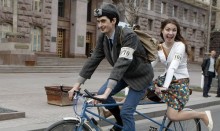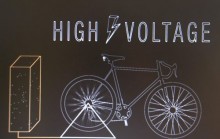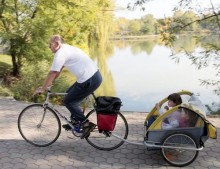I can remember that, when I was still a child somewhere in the mid-1990s, my dad always rode a bicycle to his work and to my grandmother. Economy was the main reason why he “befriended” the bike. At the time, nobody guessed yet that it is was an environment-friendly transport. Only later, when Ukrainians began to travel more often across Europe, did we learn that it was a sign of progress to ride a bicycle for business purposes.
It is at least 15 years ago that I first saw my father cycling, but the bike never became a popular transport even in western Ukraine – not in the least because there is no infrastructure. But not only this… It would not perhaps be wrong to say that most Ukrainians do not view the bicycle as a full-fledged transport. The organizers of the Rover Film Festival (“rover” is bicycle in the Lviv parlance) decided to change this attitude.
“There’s so much talk in our city that we should switch for bicycles, but the only result so far is that only a few hundred activists use them as regular transport. As we love cinema and use bicycles, we decided to combine the two likings and organize a festival. We think this can be an effective way of popularization,” says Olha RAITER, one of the fest organizers, founder and chief executive director of the Wiz-Art company.
The Rover Film Festival has rallied several non-governmental organizations of Lviv, including, in addition to Wiz-Art, the city’s Association of Bicyclists, the urban-art platform Lypneva.com, the IT festival Decoded, the bicycle workshop Franky Custom, and the blog Lviv Cycle Chic. “We will generate energy by stepping on pedals, watch films, debate, display the urban velo-fashion, make a bike from rags, hold a number of flashmobs, put on the exhibition ‘Bicycles and their People,’ and stage a major bicycle parade in the city streets,” the project’s description says. We spoke to Olha Raiter about the organizers’ concepts and on what keeps Ukrainians from changing for bikes.
Olha, are you going to screen films on this theme only?
“There will be feature and documentary films on the use of bicycles as well as on the city, the life of its people, and innovations.”
Do you popularize the bike as a mode of transport just because it does not pollute the environment or there are some other important points in cycling?
“Environmental friendliness is the first reason. I don’t know how long ago you were in Lviv, but it is next to impossible to walk on the streets. Ordinary people are raising funds to put up stakes on sidewalks so that cars do not park where pedestrians should walk. In our city, cars park on both sides of almost every street. They are allowed to go downtown, although there are no specially-equipped parking lots there. This is why we are saying no to automobiles. Naturally, the main reason is that it is a pollution-free, healthy, and inexpensive mode of transport.”
The environment-conscious young people, who are prepared to change for the bike, is today in the minority. What can encourage others to organize their life with due account of environmental protection?
“Young people are watching trends. The Rover Film Festival is sort of a small speculation on trends. A lot of young people in Lviv are riding bikes not because they want to be healthy but because it is ‘cool’ to have a bike and be photographed with one. In reality, you do not necessarily need to be a committed bike rider. Therefore, you should take a calm and practical view of this matter.”
Speaking of the practical side of the matter, the bicycle is not popular as a mode of transportation not least because there is no infrastructure, and motorists often disregard cyclists as full-fledged traffic participants.
“I am a bike rider myself. There is only a partial cycling lane from my house to the downtown. There are no such lanes in almost all parts of the city, which is really a problem. But there also are some positive sides. While, one or two years ago, motorists inadequately regarded cyclists as people who hinder them on the road, now this attitude is gradually changing. Our goal is to rally the organizations and individuals in the city and the country, who are not indifferent to this problem, around the Rover festival. It is our attempt to accumulate human energy.”
What do you think keeps Ukrainians from changing for bicycles?
“Infrastructure apart, it is also laziness. But, above all, it is the infrastructure and the fact that this mode of transport is not hyped enough. There are very few bicycle parking lots. Bikes are often stolen. And, in general, we have an automobile-centered culture.”
You will be screening films by means of the power generated by pressing bikes’ pedals. How did you hit upon this idea?
“I borrowed the idea of making bicycle-driven generators from Izabel Acevedo’s film To Put Together a Helicopter (Mexico, 2012). The movie is about a complete blackout in a city. A family wants to watch a soccer match on TV. The son hits upon the idea of producing electricity by turning pedals. When I shared my ideas with the team and we began to study this question, we saw that it was not a new idea to generate power by means of a bicycle. This occurred in Australia and the US. We decided to direct this idea to the channel we need.”
Did your team design bicycle generators on its own or did you borrow the technology?
“Generator pedals are usually immobile. Our objective was to make them mobile. The prototype of our bicycle generating plant is a light-weight box and a triangle on which the bicycle wheel is put up. But we are planning to improve the design. Yet it is not our invention, of course. Why should we reinvent the bicycle?”
It also depends on the authorities whether or not there will be conditions for safe cycling. Are Lviv officials willing to get in touch with you?
“In words – yes, but there is no essential support. Financially, the authorities do not back the festival at all.”
The Rover Film Festival team is now busy raising funds to implement the project. Its budget is 60,000 hryvnias. The fest organizers expect to raise 25,000 by collectively financing the Spilnokosht project being implementing by the Big Idea platform. This means everybody can take part in funding the Rover festival (http://biggggidea.com/project/229 is the project’s page on the Big Idea platform). The fest team is planning to use the money raised via Spilnokosht to make ten bicycle generating plants and purchase a part of the audio projection equipment.
It is no mere chance that Rover Film Festival organizers are making so much effort and spending so many resources to manufacture its unconventional equipment, for this will make the festival mobile. It is planned to hold the festival in Lviv on September 16 to 22 as part of European Mobility Week. Then it will be held in other cities.
“We were invited to Uzhhorod, Chernivtsi, and Ivano-Frankivsk. These cities have intense bicycle traffic,” Raiter says. “We got a call from Dnipropetrovsk – they also want to see us. I think it is a good unifying idea that is topical for the entire Ukraine. Many towns in our country are full of cyclists: people use bikes because there is no public transport, and it has never occurred to them that they are, in a way, progressive. And this is a long-term project.”
The Day has already reported that this spring also saw a growth of cycling in eastern, southern, and central Ukraine. It will be recalled that Dnipropetrovsk’s Yevhen Khil has organized a public bicycle hire center and his initiative was picked up by students of Dnipropetrovsk National Oles Honchar University. In Kherson, Oleksii Yevdokimov, a research associate at the Ukrainian Institute of Physics, has developed his own make of an electric motor-driven bicycle and plans to launch a large-lot production of it. Vinnytsia residents have launched their own production of bikes, and Donetsk may soon have the first full-fledged cycling lane. Public demand may prompt officials to work more actively on creating a proper infrastructure. And the Rover Film Festival, particularly its philosophy of mobility, may help greatly the supporters of cycling in various regions of Ukraine to join their efforts.










